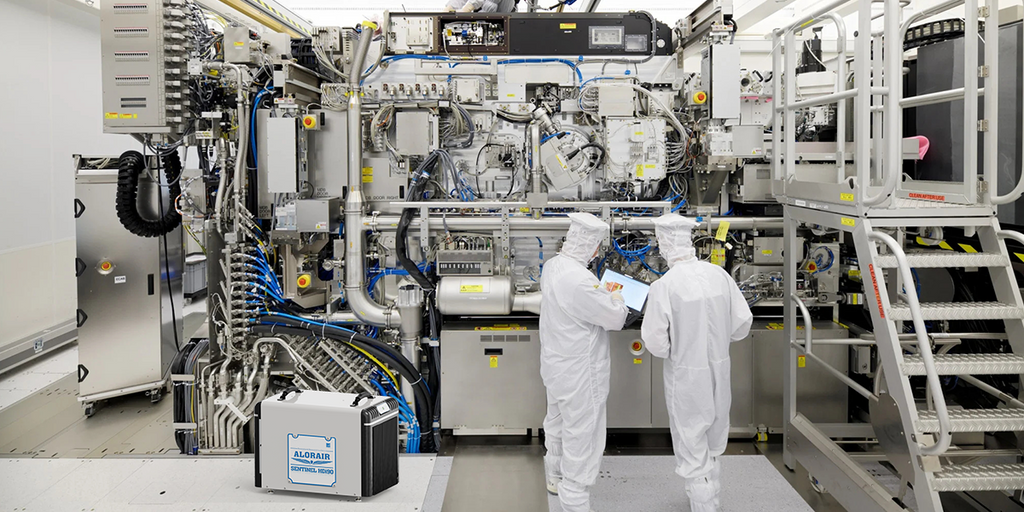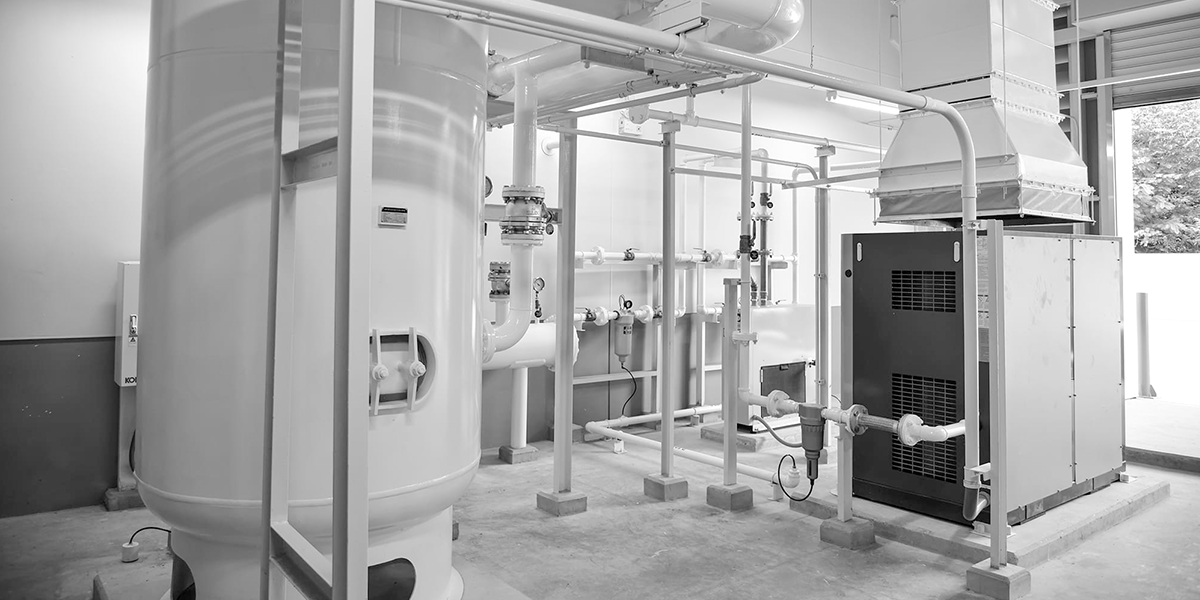In the realm of industrial applications, compressed air is often referred to as the 'fourth utility' after electricity, water, and natural gas, due to its widespread use and importance. However, a critical aspect that often goes unnoticed in the effective management of compressed air systems is the control of humidity. Excess moisture in compressed air can lead to a host of problems, affecting everything from system efficiency to product quality. This blog delves into the crucial role dehumidifiers play in drying compressed air, ensuring the smooth operation and longevity of these systems.
Understanding Compressed Air
Compressed air is essentially air that is kept under a certain pressure greater than that of the atmosphere. It is a vital power source used in a multitude of industries, including manufacturing, automotive, and pharmaceuticals. The versatility of compressed air comes from its ability to store energy and release it in controlled amounts to power various tools and machinery.
The Process of Air Compression
When air is compressed, its volume decreases, but its moisture content remains the same, leading to a higher concentration of water vapor. This process inherently introduces moisture into the system. While the air itself is compressible, the water vapor within it is not, resulting in condensation as the air is compressed and cooled. This condensation, if not properly managed, can be detrimental to the compressed air system and the applications it powers.
The Importance of Humidity Control in Compressed Air
Controlling humidity in compressed air systems is not just a matter of improving efficiency; it's a crucial requirement for the longevity and reliability of the systems and the quality of the end products. Let's delve into why managing moisture levels in compressed air is so important.
Preventing Corrosion and Damage
System Integrity: Moisture in compressed air can lead to corrosion of the air compressor and the piping system. This corrosion not only shortens the lifespan of the equipment but can also lead to leaks, reducing the system's efficiency and increasing operational costs.
Tool and Equipment Damage:Many pneumatic tools and machines are sensitive to moisture. The presence of water can cause rust and degradation, leading to frequent breakdowns and the need for replacements.
Maintaining System Efficiency
Avoiding Blockages: In colder environments, moisture in compressed air can freeze, leading to blockages in the system. This can disrupt the continuous flow of air, affecting the efficiency of the system.
Energy Efficiency: A system free of moisture runs more efficiently. Moisture in the system can cause a pressure drop, requiring more energy to maintain the desired pressure levels.
Ensuring Product Quality
Manufacturing Processes: In many manufacturing processes, the presence of moisture can compromise the quality of the finished product. For instance, in painting or coating applications, moisture can lead to a poor finish.
Contamination Risks: In industries like pharmaceuticals or food processing, moisture in compressed air can pose a risk of contamination, affecting product safety and compliance with industry standards.
The presence of moisture in compressed air systems is a significant concern that can lead to a range of problems, from equipment damage to compromised product quality. In the next section, we will explore how dehumidifiers can be effectively used to tackle this issue, ensuring the dryness of compressed air for optimal system performance.
Dehumidifiers and Compressed Air
To mitigate the challenges posed by moisture in compressed air systems, dehumidifiers emerge as a vital solution. These devices play a crucial role in ensuring the air remains dry and free from excess moisture, thus maintaining the integrity and efficiency of the compressed air system.
How Dehumidifiers Work in Compressed Air Systems

Dehumidifiers in compressed air systems work by removing water vapor from the air before it enters the system. This process typically involves:
Cooling the Air: The dehumidifier cools the compressed air, which causes the moisture in the air to condense into water droplets.
Water Removal:These droplets are then collected and removed from the system, ensuring that the air that passes through is dry.
Reheating the Air:In some systems, the dry air is then reheated to an appropriate temperature before it is released into the compressed air system.
This process effectively reduces the dew point of the air, which is the temperature at which air becomes fully saturated with water vapor and condensation begins.
Customizing Dehumidification Solutions
The choice of dehumidifier depends on several factors, including the size of the compressed air system, the ambient conditions, and the specific requirements of the application. It's important to assess these factors carefully to choose the most effective dehumidification solution for a particular compressed air system.
Enhancing System Performance
The use of dehumidifiers in compressed air systems is not just about removing moisture; it's about enhancing the overall performance of the system. Dry air is easier to compress, which can lead to energy savings as the compressor requires less power to achieve the desired pressure. Additionally, dry air reduces the risk of wear and tear on the compressor and other system components, leading to lower maintenance costs and fewer downtimes.
Ensuring Safety and Compliance
In certain industries, such as pharmaceuticals or food processing, the quality of compressed air is subject to stringent regulations. Moisture in the air can lead to contamination, which is unacceptable in these environments. Dehumidifiers ensure that the air meets the required standards, thus helping businesses comply with industry regulations and maintain high levels of safety and quality.
Versatility in Applications
Dehumidifiers can be used in a wide range of applications, from small-scale operations to large industrial facilities. Their versatility makes them suitable for various industries and processes, ensuring that they can provide effective moisture control in diverse settings.
By removing excess moisture, dehumidifiers play a critical role in maintaining the efficiency, safety, and compliance of compressed air systems. Their ability to enhance system performance and ensure air quality makes them an indispensable tool in many industrial applications.
Benefits of Using Dehumidifiers in Compressed Air Systems
The integration of dehumidifiers into compressed air systems brings a multitude of benefits, directly impacting the efficiency, longevity, and output quality of these systems. Here are some key advantages:
Extended Equipment Life
Reduced Corrosion: By removing moisture, dehumidifiers significantly reduce the risk of corrosion in air compressors and piping systems. This prolongs the life of the equipment and minimizes the need for frequent repairs or replacements.
Protection of Tools and Machinery: Dry air ensures that pneumatic tools and machinery operate efficiently without the risk of moisture-induced damage, thus extending their operational lifespan.
Improved System Efficiency
Consistent Air Flow: Dry air prevents the formation of ice blockages in colder environments, ensuring a consistent and uninterrupted flow of air through the system.
Energy Savings: A dehumidified system operates more efficiently, requiring less energy to maintain the desired pressure levels, leading to cost savings in energy consumption.
Enhanced Product Quality
Better End-Product Results:In processes like painting or coating, dry compressed air prevents moisture-related defects, ensuring a high-quality finish.
Reduced Contamination Risks:In sensitive industries like food processing or pharmaceuticals, dry air minimizes the risk of contamination, ensuring product safety and compliance with industry standards.
Conclusion
In summary, the integration of dehumidifiers into compressed air systems is a critical step towards enhancing operational efficiency, preserving equipment, and ensuring the highest quality of end products. The benefits of using dehumidifiers extend beyond mere moisture removal; they represent a comprehensive solution to a range of challenges faced in various industrial applications. As we have seen, the right dehumidification strategy can lead to significant improvements in system performance and cost savings.
Discover the Right Dehumidifier for Your Needs
Ready to enhance the efficiency and longevity of your compressed air system? Explore our selection of high-quality dehumidifiers tailored for diverse industrial needs. Whether you're dealing with corrosion issues, product quality concerns, or energy efficiency goals, we have the right solution for you.













